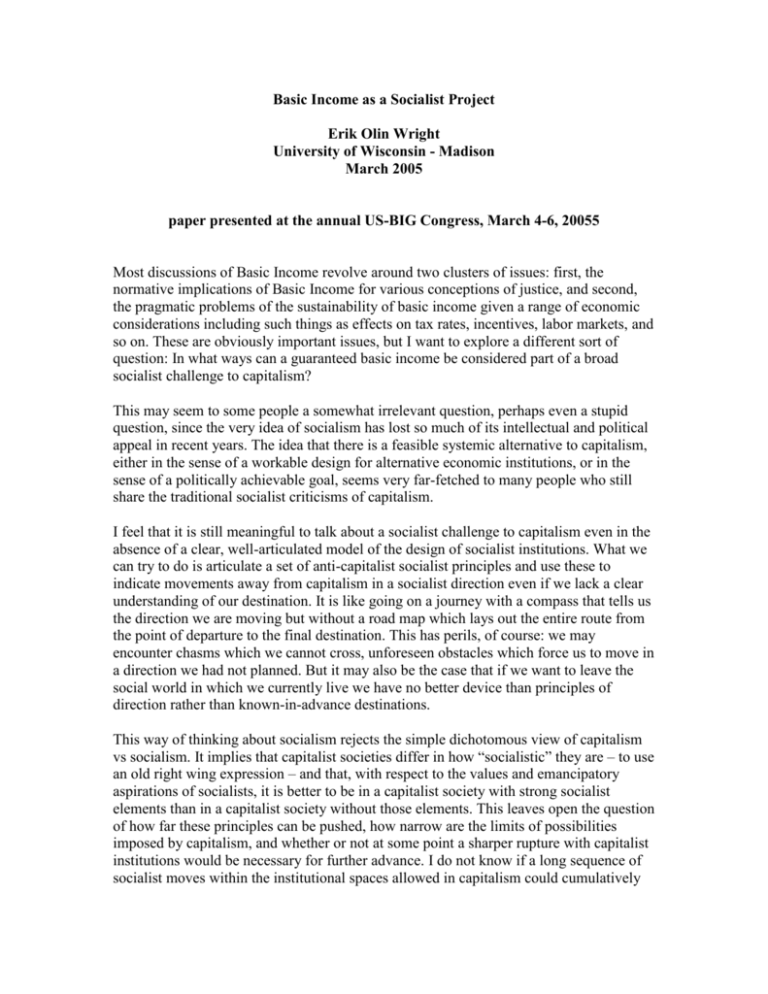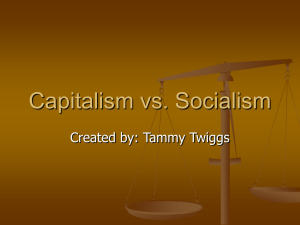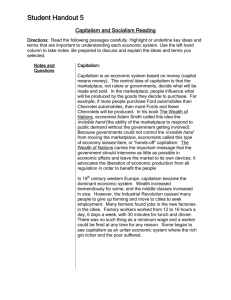Basic Income as a Socialist Project
advertisement

Basic Income as a Socialist Project Erik Olin Wright University of Wisconsin - Madison March 2005 paper presented at the annual US-BIG Congress, March 4-6, 20055 Most discussions of Basic Income revolve around two clusters of issues: first, the normative implications of Basic Income for various conceptions of justice, and second, the pragmatic problems of the sustainability of basic income given a range of economic considerations including such things as effects on tax rates, incentives, labor markets, and so on. These are obviously important issues, but I want to explore a different sort of question: In what ways can a guaranteed basic income be considered part of a broad socialist challenge to capitalism? This may seem to some people a somewhat irrelevant question, perhaps even a stupid question, since the very idea of socialism has lost so much of its intellectual and political appeal in recent years. The idea that there is a feasible systemic alternative to capitalism, either in the sense of a workable design for alternative economic institutions, or in the sense of a politically achievable goal, seems very far-fetched to many people who still share the traditional socialist criticisms of capitalism. I feel that it is still meaningful to talk about a socialist challenge to capitalism even in the absence of a clear, well-articulated model of the design of socialist institutions. What we can try to do is articulate a set of anti-capitalist socialist principles and use these to indicate movements away from capitalism in a socialist direction even if we lack a clear understanding of our destination. It is like going on a journey with a compass that tells us the direction we are moving but without a road map which lays out the entire route from the point of departure to the final destination. This has perils, of course: we may encounter chasms which we cannot cross, unforeseen obstacles which force us to move in a direction we had not planned. But it may also be the case that if we want to leave the social world in which we currently live we have no better device than principles of direction rather than known-in-advance destinations. This way of thinking about socialism rejects the simple dichotomous view of capitalism vs socialism. It implies that capitalist societies differ in how “socialistic” they are – to use an old right wing expression – and that, with respect to the values and emancipatory aspirations of socialists, it is better to be in a capitalist society with strong socialist elements than in a capitalist society without those elements. This leaves open the question of how far these principles can be pushed, how narrow are the limits of possibilities imposed by capitalism, and whether or not at some point a sharper rupture with capitalist institutions would be necessary for further advance. I do not know if a long sequence of socialist moves within the institutional spaces allowed in capitalism could cumulatively Basic Income as a Socialist Project 2 lead to a metamorphosis of capitalism itself, or whether in the end such a process will reach untransgressable limits. I don’t know how to answer such questions and I suspect that they are not really answerable. In the absence of a compelling answer, then, the best we can do is chart the principles that yield a direction of progressive change without a clear destination. If you agree that this is a good way to think about the idea of a socialist challenge to capitalism, the question, then, becomes what are the principles which tell us if we are moving in the right direction, and how basic income might contribute to this movement. Three principles of a Socialist Challenge to Capitalism There are many possible principles defining the socialist compass. Here I will focus on three: 1. Strengthening the power of labor relative to capital. This is one of the central themes of socialist thought, especially in its Marxist incarnation: socialism is a system of production within which the working class is the dominant class; capitalism is a system within which the capitalist class is the dominant class. Within capitalism, then, social changes which strengthen the power of labor can be thought of as moving in the direction of socialism even if this does not immediately threaten the dominance of capital as such. 2. Decommodifying labor power. This is also a familiar theme in discussions of socialism. One of the hallmarks of capitalism is that people who do not own means of production must sell their labor power on a labor market to an employer in order to acquire their means of subsistence. This is sometimes referred to as the commodification of labor (or perhaps, more precisely, of labor power) since people’s capacity to work is being treated as if it were a commodity. To the extent that workers are able to have their needs met outside of the market through some process of social provision, their labor power is decommodified. Commodification is thus a variable and one can speak of the degree of commodification and decommodification of labor power. If socialism is an economy directly oriented to the satisfaction of needs rather than the maximization of profit, then such decommodification of labor power can be thought of as a movement in the direction of socialism. 3. Strengthening the power of civil society to shape the priorities for the use of the social surplus and the organization of economic activity. This third point is less familiar, and perhaps more controversial. It implies a contrast between what I would call Statism, and Social-ism. Both are forms of non-capitalist economic organization. In Statism, state power plays the primary role in allocating the social surplus to alternative priorities and directing process of production. The clearest examples were the highly centralized bureaucratic systems of command economy in places like the Soviet Union. In contrast, in socialism what might be loosely termed “social power” plays this role. This is a much less clear idea than statism, and indeed many people use the term “socialism” to describe what I am here calling socialism. The idea of a socialism rooted in social power involves two crucial notions. First, the idea that social power shapes the use of the social surplus Basic Income as a Socialist Project 3 means that at the macro-level investment priorities are set through a process of vigorous public, participatory democratic deliberation rather than either through the exercise of private economic power in the market or the exercise of authoritative bureaucratic command through the state. Second, at the more micro-level, collective associations in civil society are directly engaged in economic activity to satisfy needs. Such needsoriented production is not organized through markets or by state bureaucracies, but through the self-organization of collective actors in society. This corresponds to what, in some discussions, is referred to as the “social economy”. This would include things like childcare, eldercare and home healthcare services, recreational services, and a wide array of cultural and arts activities. The production of these services in the social economy, it must be emphasized, is social, not private: the issue here is not moving childcare or eldercare services from market or the state provision back to the family. Rather, the social economy is built around the public provision of such services by collective association rather than by the state or market. Socialism, them, combines democratic deliberation over broad investment allocations with self-organized voluntary associational organization of economic activity. As in the other two principles, the strength of social power over the economy is a variable and thus we can speak of moving in a socialist direction when such power increases. Basic Income and Socialism If we accept these three principles -- Strengthening the power of labor relative to capital, Decommodifying labor power, and strengthening the social power over economic activity – as criteria for movement from capitalism towards socialism, the next questions is how different proposals for institutional reforms within capitalism might contribute to one or another of these. Reforms of pension funds which gave unions potential to exert control over the exercise of corporate power, as argued by William Greider, for example, could be viewed as contributing in some way to the third criterion. What about basic income? I will argue that Basic income can be viewed as a socialist reform on all three of these criteria. Of course, the extent to which BI contributes to a socialist project depends in significant ways upon the level of a basic income, and it depends upon on the sustainability of BI on narrowly economic grounds for all the familiar reasons explored in debates over basic income. For the present purposes I will make two assumptions: First, that an unconditional basic income is at a level that would enable a person to live a respectable, no frills level. That is, the level of the grant is sufficiently high that withdrawing from the capitalist labor market is meaningful option. Second, I will assume that a grant at this level does not generate incentive problems, either for workers or investors, of the sort that would render the grant unsustainable over time. On these assumptions, then, Basic Income would contribute to each of the three principles of a socialist project. 1. Basic Income and the balance of class power. A generous basic income has the potential to contribute, in the long run, to strengthening the power of labor viz-a-viz capital for three reasons. First, to the extent that labor markets become tighter in a capitalist economy with a basic income, the bargaining position of individual workers will increase. Second, generally speaking labor is collectively in a better bargaining Basic Income as a Socialist Project 4 position when labor markets are tight. And third, basic income is a kind of unconditional and inexhaustible strike fund, which also would contribute to strengthening the labor movement. Even if basic income was not accompanied by more favorable laws governing the process of union organizing, therefore, it would in this way enhance the capacity of workers to struggle for unions. Now unions supporters have, in some times and places, argued against basic income for a variety of reasons. Sometimes unionists object to basic income on the same grounds that unions are sometimes hostile to welfare: this is just a device by which hardworking people are forced to support the lazy. But there is also an argument more directly linked to union power: the fear is that with a basic income workers would no longer need unions. If the only function of unions were to guarantee minimum standards of living, then this might be a realistic concern. But insofar as unions are also concerned with the organization of the labor process, conditions of work, fair treatment within disputes, and so on, basic income would in no way threaten the function of unions. In any case, the added capacity for struggle provided by the guaranteed income seems likely to be a bigger effect than any marginal reduction in functions for collective organization. 2. Decommodifying labor. The most obvious effect of basic income is on the partial decommodification of labor. This is the aspect of basic income that has received the most attention. It is embodied in Philippe van Parijs clarion call “Real Freedom for All”. If a sustainable basic income provides for a culturally acceptable level of subsistence, then this means that the basic needs of people are met without the compulsion to enter the labor market. 3. Enlarging the potential for a social economy. Basic income may not, at first glance, seem to have much to do with the socialist principle of enhancing social power over economic activity. After all, basic income is an individually targeted transfer, and no constraints are placed on what the individual does with this grant. In such terms it seems like a purely individualistic reform. I think this is a very limited way of understanding the implications of basic income. We have already seen one way in which basic income may have collective consequences through the ways in which it may enhance the balance of power between labor and capital. Basic income also, I would argue, has the potential of creating the conditions for a greatly expanded and deepened social economy. The social economy is an alternative way of organizing economic activity that is distinct both from capitalist market provision and state provision. Its hallmark is production organized by collectivities directly to satisfy needs not subject to the discipline of profit-maximization or state-technocratic rationality. A significant segment of such activity involves the provision of various kinds of services, many of which are quite labor intensive. One of the main problems that collective actors face in the social economy is generating a decent standard of living for the providers of these services. This is, of course, a chronic problem in the arts, but it also affects efforts by communities to organize effective social economy services for various kinds of caring activities. Basic income substantially solves this problem. Basic income can be viewed as potentially a massive transfer of social surplus from the capitalist market sector to the social economy, from capital accumulation to Basic Income as a Socialist Project 5 what might be termed social accumulation – the accumulation of the capacity of society for self-organization of needs-oriented economic activity. By itself, of course, basic income only contributes to solving one of the problems facing an empowered social economy – the breaking of the link between a basic standard of living and participation in the capitalist labor market. It does not provide capital grants for infrastructure and nonlabor inputs for the social economy. As such, the enrichment of social economy production by basic income is likely to be limited to labor intensive services. But it is also the case that basic income provides a subsidy for political activity, for community organizing, for social movements, since these too depend, above all, on the time and energy of people. And this, in turn, may enhance the prospects for a broader array of reforms that eventually enlarge the space for movement in the direction of socialism. Conclusion All of this may seem like wishful thinking. Socialism in any sense of the word seems so far off the agenda in the American political context of today. And, of course, if I am right that a generous basic income would contribute in a meaningful way to revitalizing a socialist challenge to capitalism by partially decommodifying labor, empowering workers and enlarging the nonmarket social economy, then this may imply that basic income is even more off the agenda than we may have thought. Still, we will not live under the cloud of right wing capitalist triumphalism forever. There will be renewed episodes of progressive, egalitarian politics even in America. And when such episodes occur, basic income should be high on the agenda not simply because of the ways it directly deals with a range of fundamental issues of social justice, but because of the ways it may contribute to a broader transformation of capitalism itself.







